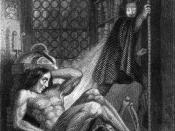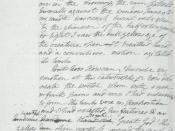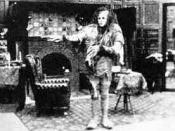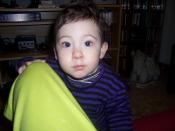Svetoslav Ivanov Georgiev
British and American studies
Year 2, Group 2, â 41590
Zealotry.of.AH@gmail.com
The Devastating Impact the Zeal of Victor Frankenstein Makes on his Life
Frankenstein has turned to be a breakthrough work as it was the forerunner of two literary categories: science fiction and horror fiction. It is also a combination of both Romantic and Gothic elements. For nearly 200 years the name Frankenstein has struck fear in the hearts of adults and children alike. Mary Shelley's Frankenstein is a far cry from the motion picture treatment of it. Many people think that the monster is named Frankenstein, but in fact, it had no name. But who is the real monster?
Victor Frankenstein succeeded in illustrating his own dark consciousness, which throughout the story stays, indeed, masked behind his noble birth and curious human form, where the real monster that thinks only of himself is lying wounded, by giving life to his creature, ready to be revealed.
But Victor Frankenstein is a blind man, who scarcely notices this and suffers, while following his zeal and trying to satisfy that curiosity of his.
Unlike the most movie treatments, the novel does not begin with a story of Victor Frankenstein's life. Instead, it begins with letters from an explorer adventurer, named Robert Walton, to his sister. Walton is the man who will eventually listen to Victor's spine-tingling tale and see the monster for himself. Using Walton as an outside frame for the story is a clever tactic by Shelley to add credibility to Victor's bizarre tale. Without Walton's corroboration of Frankenstein's tale and his actual sighting of the monster, the story might have been discounted as the ravings of a madman. But Mary Shelley had more in mind than a simple horror story. Again and again she pointed out that the monster would not have been violent, if it had not been totally rejected by its father creator and by human society. It is a warning to us not to judge people solely on their appearance.
Walton is a romantic in the traditions of the romantic adventurers at the time - yearning to search for the unknown, to cross dangerous oceans and to accept new challenges. Victor Frankenstein, of course, has the same romantic zeal, which is what drives him to create the monster. A Zeal, that sets these men so far from the average man, so that they have few friends and their actions become childish. As a result, solitude goes hand in hand with the romantic inclination and both Walton and Frankenstein talk frequently about their loneliness.
Victor and Elizabeth, a child adopted by the Frankenstein family, cherished and beloved by all who knew her, grow up together and Victor begins to develop his romantic philosophy of life. He begins to read the multitude of controversial writers of the time who enthralled him with their wild and conflicting ideas, but at the age of 15 he saw an oak tree hit by lightning, dropped his former reading and began to study natural sciences, which at the time were new and exciting subjects. At 17 he decided to become a student at the University of Ingolstadt, in order to be exposed on a different culture. But before he leaves, Elizabeth had caught the scarlet fever. While nursing her back to health, his mother contracts the disease and dies. On her death bed she requests the eventual marriage between Victor and Elizabeth, which Victor planned form the beginning. Victor says of his first experience of death: "It is so long before the mind can persuade itself that she whom we saw every day and whose very existence appeared a part of our own can have departed forever".
Victor's youthful days are filled with his love for Elizabeth and Henry Clerval - his lifelong friend who shares his romantic way of thinking. Much is made of his deep devotion so that the reader will better understand how devastated he was later, when these characters are both killed by the monster he creates. This is also a time when Victor begins a deep study of subjects that will eventually lead him to create his monster. Victor loses himself in his work, he does not go home or socialize, he totally neglects his family - not even answering their letters, and his total dedication enables him to discover the secrets to creating life - he studied the causes of death to learn the causes of life. "The world was to me a secret which I desired to divine" - says Victor as a child. His quest provides us with the perfect picture of the romantic solitary wanderer. Mary Shelley, however, does not intend to portray Victor as a mad scientist. Instead she sees his quest as altruistic and noble - to rid the world of death.
But one look at the creation, after it had awoken, disgusts, mortifies and horrifies Victor, so that he immediately turns away and abandons it in terror. Later the monster visits Victor at his bedside and attempts to speak but his creator flees the house, disappointed in the creature and himself. Victor's respond is a complete reversal of the romantic quest. And as it turns out, his rejection of the creation is what begins to turn it into an evil monster. The monster, it is revealed later, has a natural love and respect for its creator. It is not originally either violent or vicious. All it wants is to be treated like a human being. His violence is born of the frustration of being forced to live without any kind of human companionship. Another part of Frankenstein's rejection is that he does not give it a name and instead it is referred to by words such as "monster", "creature", "daemon", "fiend", and "wretch" and when Frankenstein converses with the monster in chapter 10, he addresses it as "Devil", "Vile insect", "Abhorred monster", "fiend", "wretched devil" and "abhorred devil", while, it is interesting to notice, Victor is playing God by creating life.
It is as if the monster just disappeared after being rejected by Victor, who afterwards feels isolated from the world. He is sick with fear and is afraid that the monster will approach him again. Soon afterwards he falls ill with his best friend Henry Clerval, who has come from Geneva to visit him, looking after him. As he is recovering, Victor receives a letter form Elizabeth, which causes Victor to become extremely homesick and his health improves because of that letter. But a harsh early winter prevents the journey he had planned to make and he stayed with Henry in Ingolstadt until spring, when he had fully recovered. The Frankenstein's willingness to take in Justine Moritz again shows their concern for the downtrodden. This charitable concern is a harsh lesson to Victor, who has neglected his family duties to create his monster.
Things are going well until he receives a letter from his father containing terrible news - his youngest brother - William Frankenstein has been murdered. Searchers found the body and, Shelley writes, "the print of the murderer's fingers was on his neck". Victor immediately makes plans to return home for the first time in six years. He instinctively knows that it is the monster, who has killed his brother. Although it is never said how the monster has been created and brought to life, it is assumed that the monster's life was started somehow by lightning and after being missing for two years it is lightning that reveals it's presence in the area where William was killed. The plot thickens when Justine is convicted and hanged for the murder of the child, despite the fact that all the evidence is circumstantial. After she was hanged Victor says that William and Justine were "the first hapless victims to my unhallowed arts" and believes that the natural order of things has been destroyed because he has created the monster. He feels personally responsible for the deaths of both his brother and the innocent young girl. He falls into a deep state of despair and depression over the unjust deaths. Since no one, but he, knows the true story, others cannot console him. He considers killing himself, but since that will bring even more grief to his beloved Elizabeth, he finds restraint. The injustice in the death also has Elizabeth extremely depressed. Despair and depression are common theme for the writers of the Romantic period. Finally Victor decides that to rid himself of his depression, he will eventually have to face the monster. To get away from it all and to break the depression, Victor decides to go to the mountains, of which he says: "These sublime and magnificent scenes afforded me the greatest consolation that I was capable of receiving". One day during a rainstorm he climbs to the top of a nearby mountain, where for a moment he becomes joyful and all his cares seemed behind him, but the next moment he sees his creation moving toward him at superhuman speed. Surprisingly the monster did not attack Victor. Recognizing that Frankenstein wants to destroy him, the monster begs Frankenstein to hear about what has happened to him in the past two years.Finally Frankenstein agrees to hear the monster's story and they retired to a hut in the mountain. Speaking in strikingly eloquent and detailed language the creature tells of his attempts to be accepted by humans and how it was exposed at many of the philosophies at the time, how he realized that he was like no other being and his creator did not provide him with a companion, how he feels rejected by that creator, which is incomprehensible to him, and of course, how he found out who the creator was. He also confesses that it was indeed he who killed William and framed Justine and that he did so out of revenge. Everything about the monster's story opposes the modern concept to the Frankenstein monster. His violent deeds are brought on by the scorn and contempt of society, not by an innate evil within him. Repulsed by men, the monster demands that Victor create a female companion for him. No mention is made of sexual needs, but just a desire for companionship and sympathy. At first Victor refuses the demand, but finally, against his better judgment, when the monster has assured him that both him and his companion will never be seen by men again, he agrees and is warned by the monster that when Victor begins to create his mate, he will be watching.
Soon Victor falls into a deep depression over his promise. He realizes how long the study and the creation of a new creature will take. This is another time when Victor Frankenstein has neglected the important things in his life.
Still depressed he and Clerval go to England for a rest. After a time they receive an invitation to visit friends in Scotland and set out. Once reaching Scotland, Victor isolates himself from Henry to begin creating the monster's mate. He is on an island where there are only three small huts, one of which Victor rents and begins his depressing and disturbing work. Marry Shelley never explains how it is possible for Victor to come up with the body parts he needs in such a desolate place. However, Victor is concerned that while his male creation has promised to leave the region, he cannot be sure that his new creation will do the same and that she could be more violent than the monster he has created. One evening he looks up to see the monster peering at him. When Victor sees the creature he knows he cannot continue his work and immediately tears the new creature into pieces. The monster lets out a mournful cry and disappears into the night. In several hours it returns and tells Victor the terrible misery that he has suffered and wonders how Victor could possibly be so cruel as to destroy all his hopes. The creature also threatens him - "I shall be with you on your wedding-night".
Victor responds to the threat by attacking the monster but the monster eludes him. He becomes too upset to sleep and decides to dump the body parts at sea. The wind pushes him far from shore. Hours pass before he can return to shore, and when he does, he is in Ireland. When he lands, he is immediately taken to a local magistrate because a man has been found murdered in the village and his whereabouts need to be accounted for. When Victor is shown the lifeless body, he discovers it is his lifelong friend Henry Clerval, who had gone to Ireland after leaving him. Victor becomes hysterical. He is imprisoned as a suspect in the murder and that he does not even realize. When he finally realizes he is in prison, he is overcome by gloom and misery. Finally after his father visits and improves Victor's spirits, he is acquitted of the crime. He heads back to Geneva, knowing that the monster is responsible for three deaths. After reaching France he receives a letter form Elizabeth that releases him of all obligations of marriage. But Victor wants to marry her and decides to do so, despite the monster's warning. He hopes the marriage will bring happiness to both Elizabeth and his father and writes back to Elizabeth that he will marry her, but has to reveal the terrible secret first. The wedding is arranged and Victor starts to arrange daggers and pistols for protection against the monster. The ceremony is performed without incident and the couple decides to stay for the night at a nearby hotel and to continue their trip the next day. A heavy storm descents, which causes Victor to become even more fearful and when he finds Elizabeth lifeless and inanimate, he falls to the floor. When he revives, he goes to her body, feels her coldness and realizes she is dead. He spots the monster, shoots at him but it disappears. With the help of the villagers he tries to find him but in vane. Fearing for the lives of his father and brother Ernest, Victor returns home to find them all right, however, his father overcome by the death of Elizabeth soon dies of grief - the fifth Victim of the monster. At this point the deaths become too much for Victor. He goes mad and has to be kept in a solitary cell for several months. Upon being released, victor reports the crime to a magistrate. The magistrate first does not believe the story. Finally he says that even if it is true he has no power to capture such a monster. Victor says to the magistrate that he will devote the rest of his life to finding and killing the monster. He travels the world searching for him enduring an unbelievable hardship. Revenge is the only thing that is keeping him alive. The monster leaves messages and one of them inspires Victor to follow him to the frozen north.
When Victor stumbles on Walton's ship, he is near death. Victor's passion plus Walton's own sighting the monster convinces him that Victor's story is true. The only thing missing is how Victor had created the monster. Even when pressed, Victor would not reveal his secrets. Movie versions of the novel have attempted to guess how he did it but Shelley does not include it in her writing. When Victor realized that Walton had written down his entire story, he read the narrative himself and made corrections. After telling the story, Victor's health declines and finally he dies. Then Walton sees the monster over his dead creator's coffin, which he describes as "gigantic in stature, yet uncouth and distorted in its proportions". Walton writes the creature is the most loathsome and hideous thing he has ever seen. Then the monster speaks to Walton explaining it was heartbroken after killing Clerval and saying he "was the slave, not the master, of an impulse which I detested yet could not disobey". Finally the monster himself says it should not be considered a criminal and that it only sought love and kindness but was driven from the doors of human kind.
Provoked by the course of nature, and even trying to fight the good fight in an age, when not only language but also science, beyond all comparison with their present forms, was a crippled bastard seeking cure, motivation and even protection all but vengeance, like his creature compared to humans, Victor Frankenstein's childish but relevant tendencies were of vital importance for him in succeeding to perverting his zeal. But these are forms, which are not even on the verge of the proper side of development as an abstract limitation that humans have continuously set and expanded since the creation of language itself, long before exact forms like separation, definition and significance appeared. Curiosity killed the cat? Old sayings demonstrate outdated thinking. As a child curiosity was Victor's primary learning tool, but the horrific experience of his mother's death and the sense of fear made him weak and subservient to his zeal. He feels it and believes in it. For Victor it was too late. The more he touched, the more he felt but his eyes "have generally an expression of wildness, and even madness", which is characteristic of the monster's appearance, however, when treated with kindness, which his monster has never received, Frankenstein responds with, according to Walton, "a beam of benevolence and sweetness that I never saw equaled". It seems it is not only a matter of how you perceive the world around you, how environment and gained experience affect your thoughts, but also how you deal with these and interpret them so that you can be prepared to act adequately in any situation that demands this realization of thoughts. But thoughts are just imperfect unspoken words, not performed actions. It is the choices that make us who we are and we always have a choice, which is difficult for a blind man, such as Victor Frankenstein, who is scared of interests he had as a child, to see and follow out.
Reference:
Shelley, M. Frankenstein, or the Modern Prometheus (eBook #84 October 31, 1993, Project Gutenberg), Retrieved April 02, 2007, from Gutenberg.org website: http://www.gutenberg.org/dirs/etext93/frank15.txt
�PAGE � �PAGE �7�




